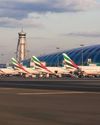The first thing commuters see when they arrive in Wangjing – a northeastern subdistrict of Beijing – is a fibreglass sculpture of a mother and baby panda placidly chewing on bamboo. The gentle maternal tableau speaks to the former wholly residential nature of the area, but nowadays that homely image is somewhat misleading.

Around 20 years ago, the commuters were heading in the opposite direction. Wangjing, then nicknamed “Sleeping City”, was nothing more than a bedroom community – a place for workers to lay their heads at cheap rents after a hard day’s toil in the city. Although strategically placed between the airport and the CBD, there were few shops, hardly any restaurants and absolutely nothing in the way of big business in what was then considered a remote location.
Today, the district, which lies between the fourth and fifth ring roads that encase the city in ever-tightening loops, is a buzzing hive of established and striving tech companies. The area’s new profile, led by the likes of Sony, Panasonic, Daimler, Alibaba and Meituan-Dianping, is bringing in a full spectrum of lifestyle and entertainment outlets, in turn attracting a cosmopolitan and talented workforce.
Tech businesses first started to trickle into Wangjing in the early 1990s as the northwestern enclave of Zhongguancun, then regarded as Beijing’s Silicon Valley, became increasingly overpriced and oversaturated. Along with the newcomers came a gradual wave of international restaurants, bars and hotels.
Government attempts to smooth the path for businesses in China has seen the country rise by 32 spots (from 78 to 46) in the World Bank’s latest Ease of Doing Business report. With red tape and bureaucracy slashed considerably, setting up shop in the Middle Kingdom now takes only nine days, in theory.
According to a 2018 report by CB Insights, Beijing is on track to eclipse Silicon Valley as the world’s biggest startup hub; the report adds that Beijing and Shanghai “lead among high-growth hubs for unicorns, mega-rounds and large exits. Company creation is accelerating.”
هذه القصة مأخوذة من طبعة May - June 2019 من Business Traveller Middle East.
ابدأ النسخة التجريبية المجانية من Magzter GOLD لمدة 7 أيام للوصول إلى آلاف القصص المتميزة المنسقة وأكثر من 9,000 مجلة وصحيفة.
بالفعل مشترك ? تسجيل الدخول
هذه القصة مأخوذة من طبعة May - June 2019 من Business Traveller Middle East.
ابدأ النسخة التجريبية المجانية من Magzter GOLD لمدة 7 أيام للوصول إلى آلاف القصص المتميزة المنسقة وأكثر من 9,000 مجلة وصحيفة.
بالفعل مشترك? تسجيل الدخول

Onwards and upwards
In an exclusive interview with Ian Fairservice for Business Traveller, His Highness Sheikh Ahmed bin Saeed Al Maktoum, President of the Dubai Civil Aviation Authority and CEO and Founder of the Emirates Group, provides insight into the current and future state of travel and Emirates’ pivotal role in getting the industry back on track

Cleaning up the crisis
How hotels have risen to the challenge of keeping guests safe during the pandemic

The Great Vegas Meetings Magic Act
The city is working hard to conjure up events and make millions of visitors reappear

TAKES OFF
Corporations are seeking new travel solutions that put safety and convenience first

TEE TIME IN TOKYO
The Tokyo Olympics may be delayed, but the golf courses around Japan’s capital aren’t slowing down

KEYS TO THE KINGDOM
New and upcoming hotels to check out when you next visit Saudi Arabia

QATAR CALLING
A swathe of hotels are opening in the Gulf State in the run-up to the 2022 FIFA World Cup

MEMPHIS CON BRIO
Music and history flood through the heart and soul of this quintessential American river town

Sofitel Mumbai BKC
BACKGROUND Sofitel Mumbai BKC is one of Accor’s most prominent addresses in Mumbai, Maharashtra. The French hospitality group’s other hotels in the city are operated under the Novotel and ibis brands.

Taking Scotland in Stride
A walk through the Highlands and Borders is the best way to touch this country’s history and nature